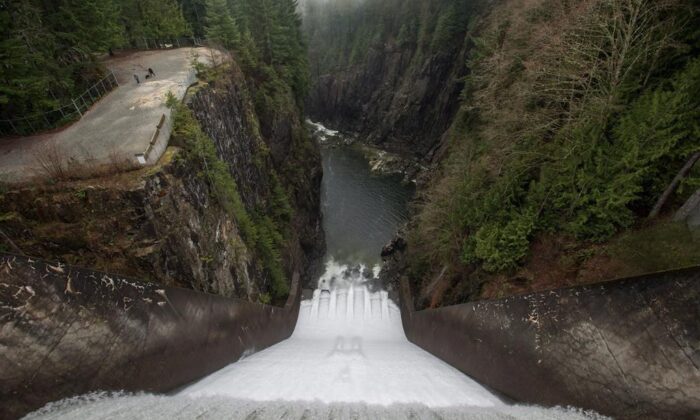
A woman whose husband saw a “wall of water rushing toward them” as the pair fled a huge torrent released from a North Vancouver dam is suing Metro Vancouver’s regional district for negligence.
The notice of civil claim filed by Chihiro Nakamura says she and her husband were sitting on a rock in a shallow part of the Capilano River below the Cleveland Dam when they heard a rushing sound.
The B.C. Supreme Court lawsuit says there had been no warning on Oct. 1, 2020, when water from the 91−metre dam came pouring down the canyon, rising by nearly 3.6 metres and killing two fishermen downstream.
Nakamura’s husband made it to shore, but the lawsuit says she had to climb onto a tree hanging over the river, where “she thought she was going to die” until she was rescued by firefighters.
The legal action filed this month says Nakamura suffered physical injuries as well as post−traumatic stress disorder, and asks the court to grant damages for pain and suffering, loss of income, and other alleged losses, such as the cost of medication.
A statement from the commissioner of the regional district, Jerry Dobrovolny, says Metro Vancouver began an “urgent and comprehensive review” after the release, looking at programming, operations, and internal protocols at the site, and a public alarm system was installed in May 2021.
Dobrovolny said shortly after the water release that a gate controlling the flow of water had come down too quickly during maintenance work on the dam, and the district’s preliminary investigation found human error was the clearest factor.
The district takes full responsibility for the mistake, he said at the time.
It dismissed three employees after the incident.
Metro Vancouver received Nakamura’s claim last week, Dobrovolny’s latest statement says.
“Over the past two years, we have had no direct contact from the couple other than receiving their claims this past Friday, and they have made no prior attempts to work with us or notify us about their experience,” it says.
Metro Vancouver has consulted with the public and stakeholders to learn about their experiences along the river, while studying its hydrology and conducting surveys to determine patterns of public use to inform long−term public safety enhancements, the statement adds.